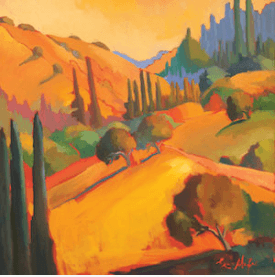
Born in Big Sur and raised at Nepenthe, her grandparents’ iconic restaurant located just north of Esalen, painter and Esalen faculty member Erin Lee Gafill grew up in a household where creativity reigned. From making holiday ornaments out of tin cans and building her own toys out of scrap wood to writing plays, painting and dancing, Erin continues to weave the creative process into all layers of her life.
We spoke to Erin about her creative habits, the power of the Big Sur landscape and what we can all do to bring more creativity into our lives.
Esalen News: What are your daily creative habits?
My daily creative habits begin the night before, when I write down my “to dos” for the following day. That daily list includes 10 minutes of free writing, usually done before I get out of bed, 20 minutes or so of yoga upon rising, and then reviewing and revising my plan of action for the day.
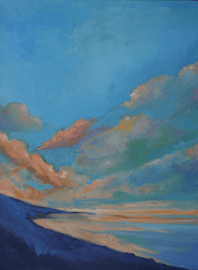
My “to do” list gives me a moment to anticipate where I want my day to go, and I try to write down everything I actually am going to do including laundry, checking emails, etc., so I can improve my reality base for what is actually possible in any given day. This list is also a chance to reflect on what really matters, and to eliminate what doesn’t. A painting day will include four hours of painting. I schedule this like anything else, and hold to it.
Esalen News: Can you share some of the painting techniques you utilize?
I paint plein air (out of doors) to train myself to make decisions quickly, to get the big idea on the canvas right away, and to really be in contact with the particular light and color of any given moment. Plein air means working fast and avoiding perfectionism. Most pieces painted plein air are completed in 20 minutes to two hours. This method of working brings you into direct contact with the elements — changing light, changing weather — in a way that nothing else replicates.
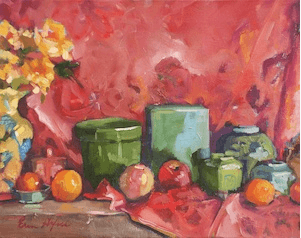
Painting still lifes is a more gentle and meditative practice. I can sink into a day of painting objects for hours on end. Still life gives me a wide range of colors and shapes to play with and the ability to create a controlled light environment. Each still life begins with handling an object, connecting with it, arranging it together with other objects and then studying them in relationship to one another. You can create a real sense of mood in a still life by working in one color family — all blues and greens, say — as if for a day or so you are creating a little world of your own devising to dwell in for a while.
Esalen News: How does Big Sur inform your creative practice?
I grew up in Big Sur with the daily presence of extraordinary beauty. It has nurtured in me a reverence for nature, as well as a desire to respond in some creative way, be it through writing a poem or creating a painting. The big sky, vast sea and the scale of the mountains teach me the power of big shape-making in painting. It is a daily visual reminder of simplicity, harmony, power and balance.
Esalen News: What simple creative practice people can do at home?
An exercise for visual awareness is to pick up a pen and piece of paper, set the timer for three or so minutes, and draw the contours of what is around you: the cup on the table, the stack of books, the man sitting on a chair, the couch — whatever you see.
Now do it again with your other hand, same time frame, same scenario. It’s quite extraordinary how differently we draw and how differently we feel about our drawing when we’ve done this once or twice. It can be a revelation and very freeing to draw with the nondominant hand. All expectation falls away, and you’re just enjoying the process.
Erin’s next workshop is The Art of Now.
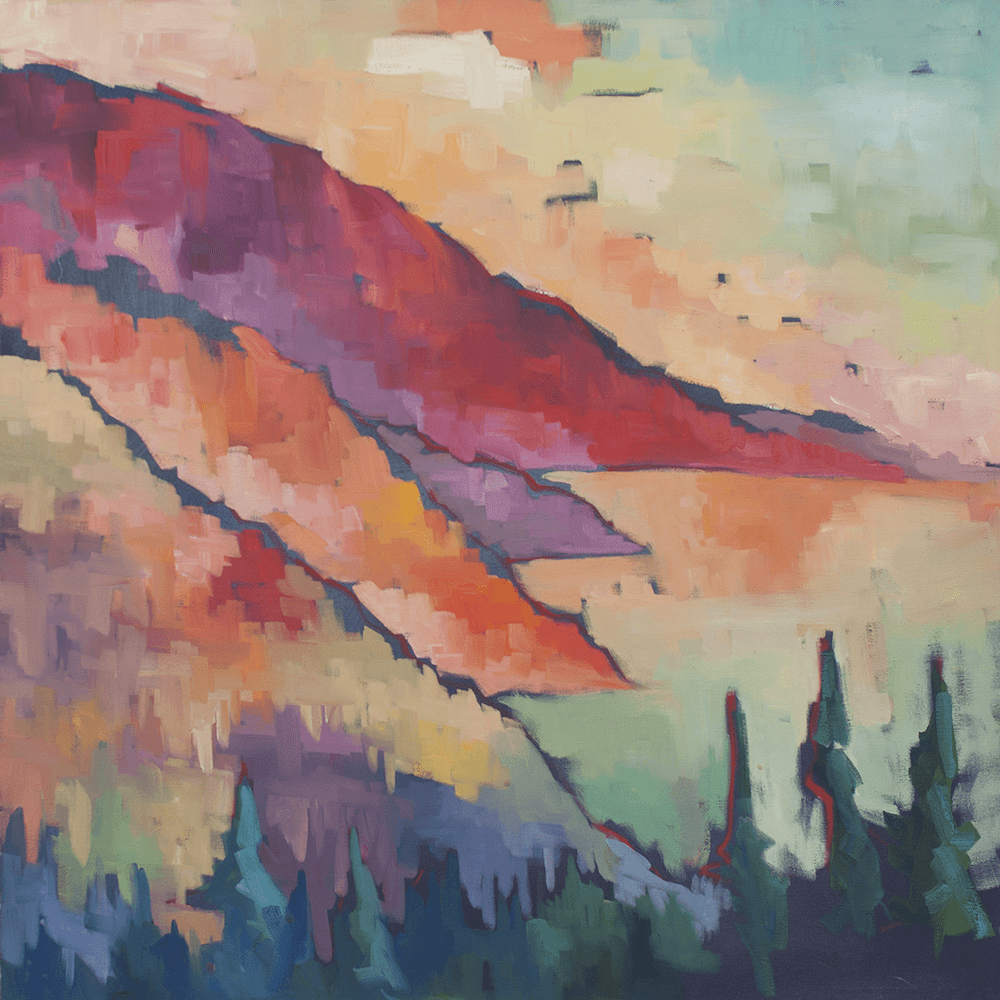

“Remembering to be as self compassionate as I can and praying to the divine that we're all a part of.”
–Aaron
“Prayer, reading, meditation, walking.”
–Karen
“Erratically — which is an ongoing stream of practice to find peace.”
–Charles
“Try on a daily basis to be kind to myself and to realize that making mistakes is a part of the human condition. Learning from our mistakes is a journey. But it starts with compassion and caring. First for oneself.”
–Steve
“Physically: aerobic exercise, volleyball, ice hockey, cycling, sailing. Emotionally: unfortunately I have to work to ‘not care’ about people or situations which may end painfully. Along the lines of ‘attachment is the source of suffering’, so best to avoid it or limit its scope. Sad though because it could also be the source of great joy. Is it worth the risk?“
–Rainer
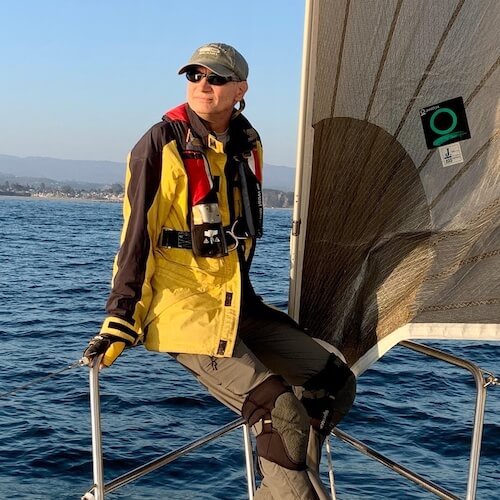

“It's time for my heart to be nurtured on one level yet contained on another. To go easy on me and to allow my feelings to be validated, not judged harshly. On the other hand, to let the heart rule with equanimity and not lead the mind and body around like a master.”
–Suzanne
“I spend time thinking of everything I am grateful for, and I try to develop my ability to express compassion for myself and others without reservation. I take time to do the things I need to do to keep myself healthy and happy. This includes taking experiential workshops, fostering relationships, and participating within groups which have a similar interest to become a more compassionate and fulfilled being.“
–Peter
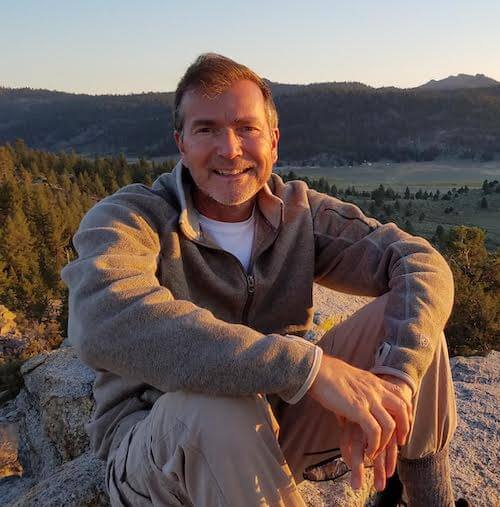
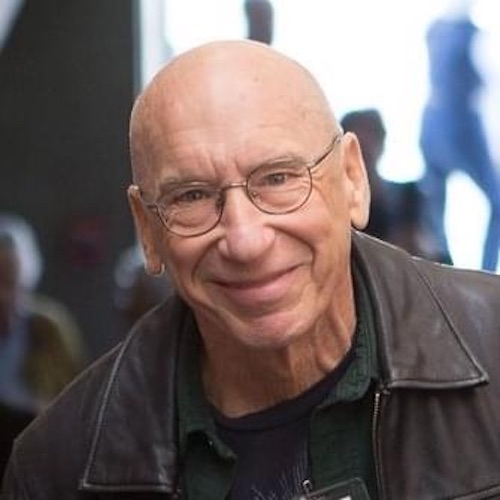
“Self-forgiveness for my own judgments. And oh yeah, coming to Esalen.”
–David B.
“Hmm, this is a tough one! I guess I take care of my heart through fostering relationships with people I feel connected to. Spending quality time with them (whether we're on the phone, through messages/letters, on Zoom, or in-person). Being there for them, listening to them, sharing what's going on with me, my struggles and my successes... like we do in the Esalen weekly Friends of Esalen Zoom sessions!”
–Lori

“I remind myself in many ways of the fact that " Love is all there is!" LOVE is the prize and this one precious life is the stage we get to learn our lessons. I get out into nature, hike, camp, river kayak, fly fish, garden, I create, I dance (not enough!), and I remain grateful for each day, each breath, each moment. Being in the moment, awake, and remembering the gift of life and my feeling of gratitude for all of creation.”
–Steven
“My physical heart by limiting stress and eating a heart-healthy diet. My emotional heart by staying in love with the world and by knowing that all disappointment and loss will pass.“
–David Z.
Today, September 29, is World Heart Day. Strike up a conversation with your own heart and as you feel comfortable, encourage others to do the same. As part of our own transformations and self-care, we sometimes ask for others to illuminate and enliven our hearts or speak our love language.
What if we could do this for ourselves too, even if just for today… or to start a heart practice, forever?

Born in Big Sur and raised at Nepenthe, her grandparents’ iconic restaurant located just north of Esalen, painter and Esalen faculty member Erin Lee Gafill grew up in a household where creativity reigned. From making holiday ornaments out of tin cans and building her own toys out of scrap wood to writing plays, painting and dancing, Erin continues to weave the creative process into all layers of her life.
We spoke to Erin about her creative habits, the power of the Big Sur landscape and what we can all do to bring more creativity into our lives.
Esalen News: What are your daily creative habits?
My daily creative habits begin the night before, when I write down my “to dos” for the following day. That daily list includes 10 minutes of free writing, usually done before I get out of bed, 20 minutes or so of yoga upon rising, and then reviewing and revising my plan of action for the day.

My “to do” list gives me a moment to anticipate where I want my day to go, and I try to write down everything I actually am going to do including laundry, checking emails, etc., so I can improve my reality base for what is actually possible in any given day. This list is also a chance to reflect on what really matters, and to eliminate what doesn’t. A painting day will include four hours of painting. I schedule this like anything else, and hold to it.
Esalen News: Can you share some of the painting techniques you utilize?
I paint plein air (out of doors) to train myself to make decisions quickly, to get the big idea on the canvas right away, and to really be in contact with the particular light and color of any given moment. Plein air means working fast and avoiding perfectionism. Most pieces painted plein air are completed in 20 minutes to two hours. This method of working brings you into direct contact with the elements — changing light, changing weather — in a way that nothing else replicates.

Painting still lifes is a more gentle and meditative practice. I can sink into a day of painting objects for hours on end. Still life gives me a wide range of colors and shapes to play with and the ability to create a controlled light environment. Each still life begins with handling an object, connecting with it, arranging it together with other objects and then studying them in relationship to one another. You can create a real sense of mood in a still life by working in one color family — all blues and greens, say — as if for a day or so you are creating a little world of your own devising to dwell in for a while.
Esalen News: How does Big Sur inform your creative practice?
I grew up in Big Sur with the daily presence of extraordinary beauty. It has nurtured in me a reverence for nature, as well as a desire to respond in some creative way, be it through writing a poem or creating a painting. The big sky, vast sea and the scale of the mountains teach me the power of big shape-making in painting. It is a daily visual reminder of simplicity, harmony, power and balance.
Esalen News: What simple creative practice people can do at home?
An exercise for visual awareness is to pick up a pen and piece of paper, set the timer for three or so minutes, and draw the contours of what is around you: the cup on the table, the stack of books, the man sitting on a chair, the couch — whatever you see.
Now do it again with your other hand, same time frame, same scenario. It’s quite extraordinary how differently we draw and how differently we feel about our drawing when we’ve done this once or twice. It can be a revelation and very freeing to draw with the nondominant hand. All expectation falls away, and you’re just enjoying the process.
Erin’s next workshop is The Art of Now.


“Remembering to be as self compassionate as I can and praying to the divine that we're all a part of.”
–Aaron
“Prayer, reading, meditation, walking.”
–Karen
“Erratically — which is an ongoing stream of practice to find peace.”
–Charles
“Try on a daily basis to be kind to myself and to realize that making mistakes is a part of the human condition. Learning from our mistakes is a journey. But it starts with compassion and caring. First for oneself.”
–Steve
“Physically: aerobic exercise, volleyball, ice hockey, cycling, sailing. Emotionally: unfortunately I have to work to ‘not care’ about people or situations which may end painfully. Along the lines of ‘attachment is the source of suffering’, so best to avoid it or limit its scope. Sad though because it could also be the source of great joy. Is it worth the risk?“
–Rainer


“It's time for my heart to be nurtured on one level yet contained on another. To go easy on me and to allow my feelings to be validated, not judged harshly. On the other hand, to let the heart rule with equanimity and not lead the mind and body around like a master.”
–Suzanne
“I spend time thinking of everything I am grateful for, and I try to develop my ability to express compassion for myself and others without reservation. I take time to do the things I need to do to keep myself healthy and happy. This includes taking experiential workshops, fostering relationships, and participating within groups which have a similar interest to become a more compassionate and fulfilled being.“
–Peter


“Self-forgiveness for my own judgments. And oh yeah, coming to Esalen.”
–David B.
“Hmm, this is a tough one! I guess I take care of my heart through fostering relationships with people I feel connected to. Spending quality time with them (whether we're on the phone, through messages/letters, on Zoom, or in-person). Being there for them, listening to them, sharing what's going on with me, my struggles and my successes... like we do in the Esalen weekly Friends of Esalen Zoom sessions!”
–Lori

“I remind myself in many ways of the fact that " Love is all there is!" LOVE is the prize and this one precious life is the stage we get to learn our lessons. I get out into nature, hike, camp, river kayak, fly fish, garden, I create, I dance (not enough!), and I remain grateful for each day, each breath, each moment. Being in the moment, awake, and remembering the gift of life and my feeling of gratitude for all of creation.”
–Steven
“My physical heart by limiting stress and eating a heart-healthy diet. My emotional heart by staying in love with the world and by knowing that all disappointment and loss will pass.“
–David Z.
Today, September 29, is World Heart Day. Strike up a conversation with your own heart and as you feel comfortable, encourage others to do the same. As part of our own transformations and self-care, we sometimes ask for others to illuminate and enliven our hearts or speak our love language.
What if we could do this for ourselves too, even if just for today… or to start a heart practice, forever?

Born in Big Sur and raised at Nepenthe, her grandparents’ iconic restaurant located just north of Esalen, painter and Esalen faculty member Erin Lee Gafill grew up in a household where creativity reigned. From making holiday ornaments out of tin cans and building her own toys out of scrap wood to writing plays, painting and dancing, Erin continues to weave the creative process into all layers of her life.
We spoke to Erin about her creative habits, the power of the Big Sur landscape and what we can all do to bring more creativity into our lives.
Esalen News: What are your daily creative habits?
My daily creative habits begin the night before, when I write down my “to dos” for the following day. That daily list includes 10 minutes of free writing, usually done before I get out of bed, 20 minutes or so of yoga upon rising, and then reviewing and revising my plan of action for the day.

My “to do” list gives me a moment to anticipate where I want my day to go, and I try to write down everything I actually am going to do including laundry, checking emails, etc., so I can improve my reality base for what is actually possible in any given day. This list is also a chance to reflect on what really matters, and to eliminate what doesn’t. A painting day will include four hours of painting. I schedule this like anything else, and hold to it.
Esalen News: Can you share some of the painting techniques you utilize?
I paint plein air (out of doors) to train myself to make decisions quickly, to get the big idea on the canvas right away, and to really be in contact with the particular light and color of any given moment. Plein air means working fast and avoiding perfectionism. Most pieces painted plein air are completed in 20 minutes to two hours. This method of working brings you into direct contact with the elements — changing light, changing weather — in a way that nothing else replicates.

Painting still lifes is a more gentle and meditative practice. I can sink into a day of painting objects for hours on end. Still life gives me a wide range of colors and shapes to play with and the ability to create a controlled light environment. Each still life begins with handling an object, connecting with it, arranging it together with other objects and then studying them in relationship to one another. You can create a real sense of mood in a still life by working in one color family — all blues and greens, say — as if for a day or so you are creating a little world of your own devising to dwell in for a while.
Esalen News: How does Big Sur inform your creative practice?
I grew up in Big Sur with the daily presence of extraordinary beauty. It has nurtured in me a reverence for nature, as well as a desire to respond in some creative way, be it through writing a poem or creating a painting. The big sky, vast sea and the scale of the mountains teach me the power of big shape-making in painting. It is a daily visual reminder of simplicity, harmony, power and balance.
Esalen News: What simple creative practice people can do at home?
An exercise for visual awareness is to pick up a pen and piece of paper, set the timer for three or so minutes, and draw the contours of what is around you: the cup on the table, the stack of books, the man sitting on a chair, the couch — whatever you see.
Now do it again with your other hand, same time frame, same scenario. It’s quite extraordinary how differently we draw and how differently we feel about our drawing when we’ve done this once or twice. It can be a revelation and very freeing to draw with the nondominant hand. All expectation falls away, and you’re just enjoying the process.
Erin’s next workshop is The Art of Now.


“Remembering to be as self compassionate as I can and praying to the divine that we're all a part of.”
–Aaron
“Prayer, reading, meditation, walking.”
–Karen
“Erratically — which is an ongoing stream of practice to find peace.”
–Charles
“Try on a daily basis to be kind to myself and to realize that making mistakes is a part of the human condition. Learning from our mistakes is a journey. But it starts with compassion and caring. First for oneself.”
–Steve
“Physically: aerobic exercise, volleyball, ice hockey, cycling, sailing. Emotionally: unfortunately I have to work to ‘not care’ about people or situations which may end painfully. Along the lines of ‘attachment is the source of suffering’, so best to avoid it or limit its scope. Sad though because it could also be the source of great joy. Is it worth the risk?“
–Rainer


“It's time for my heart to be nurtured on one level yet contained on another. To go easy on me and to allow my feelings to be validated, not judged harshly. On the other hand, to let the heart rule with equanimity and not lead the mind and body around like a master.”
–Suzanne
“I spend time thinking of everything I am grateful for, and I try to develop my ability to express compassion for myself and others without reservation. I take time to do the things I need to do to keep myself healthy and happy. This includes taking experiential workshops, fostering relationships, and participating within groups which have a similar interest to become a more compassionate and fulfilled being.“
–Peter


“Self-forgiveness for my own judgments. And oh yeah, coming to Esalen.”
–David B.
“Hmm, this is a tough one! I guess I take care of my heart through fostering relationships with people I feel connected to. Spending quality time with them (whether we're on the phone, through messages/letters, on Zoom, or in-person). Being there for them, listening to them, sharing what's going on with me, my struggles and my successes... like we do in the Esalen weekly Friends of Esalen Zoom sessions!”
–Lori

“I remind myself in many ways of the fact that " Love is all there is!" LOVE is the prize and this one precious life is the stage we get to learn our lessons. I get out into nature, hike, camp, river kayak, fly fish, garden, I create, I dance (not enough!), and I remain grateful for each day, each breath, each moment. Being in the moment, awake, and remembering the gift of life and my feeling of gratitude for all of creation.”
–Steven
“My physical heart by limiting stress and eating a heart-healthy diet. My emotional heart by staying in love with the world and by knowing that all disappointment and loss will pass.“
–David Z.
Today, September 29, is World Heart Day. Strike up a conversation with your own heart and as you feel comfortable, encourage others to do the same. As part of our own transformations and self-care, we sometimes ask for others to illuminate and enliven our hearts or speak our love language.
What if we could do this for ourselves too, even if just for today… or to start a heart practice, forever?